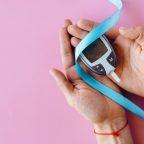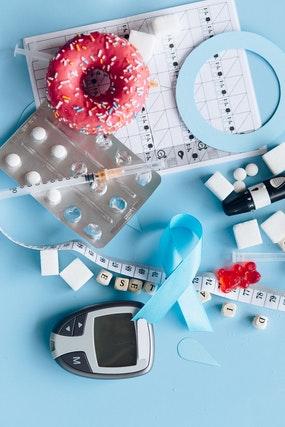Posts Tagged ‘hyperglycemia treatment’

Hyperglycemia Levels
Hyperglycemia is a condition in which the level of glucose in the blood increases. A subject with a fixed range above 126 mg/dL or 7 mmol/L is generally considered hyperglycemic, while a fixed range below 70 mg/dL or 4 mmol/L is considered hypoglycemic.
Human blood glucose levels vary at different times of the day and before and after meals. Hyperglycemia may occur in individuals with undiagnosed diabetes. It can also occur if a person with diabetes does not follow their treatment regimen. Hyperglycemia can cause various symptoms.
The three classic symptoms of hyperglycemia are frequent urination, frequent hunger, and frequent thirst. Some other symptoms may appear, such as blurred vision, poor wound healing, dry mouth, fatigue, and others. Symptoms may not appear until blood glucose levels reach 15-20 mmol/L (270-360 mg/dL) or higher. Blood glucose levels that are a little higher than normal can cause long-term damage.
Glucose Levels
The level of glucose in the blood should be maintained in the normal range. Homeostasis plays an important role in the efficiency of the body in performing physiological processes. Changes in blood glucose, whether it is rising or falling, can affect the processes of the body. It may also cause damage.
Hyperglycemia can damage the kidneys and retina. It can also damage the heart and blood vessels. This condition can be caused by several conditions such as diabetes, physiological stress, serious illness, or certain medications. Treating hyperglycemia is aimed at treating the underlying cause.
For people with diabetes, it is very important to follow the treatment regimen. They also need to monitor their diet and lifestyle. It is also important to check your blood glucose levels regularly. If symptoms of hyperglycemia appear, it is highly recommended to consult a doctor immediately. This is necessary to make an accurate diagnosis and choose the appropriate treatment. It is also necessary to prevent the development of complications.
Types of hyperglycemia

Hyperglycemia in patients with diabetes can be of two types: fasting hyperglycemia or postprandial hyperglycemia.
Fasting hyperglycemia is a condition in which blood sugar levels exceed 130 mg/dL after fasting for at least 8 hours.
If you have postprandial hyperglycemia, your postprandial blood sugar should not exceed 140 mg/dL, except in rare cases associated with heavy metals. If postprandial hyperglycemia is persistently high, this may be a sign of the onset of type 2 diabetes.
In people without diabetes, hyperglycemia is usually caused by high levels of stress, medications, eating disorders, and a lack of regular exercise.
Meditation and stress sometimes disrupt blood sugar levels and develop into hyperglycemia. If you consume a lot of calories from complex and simple carbohydrates in your meals, your blood sugar levels will also rise.
Hyperglycemia Symptoms
The symptoms must be understood to know what to do when a person has hyperglycemia. You will usually notice hyperglycemia levels and high levels of sugar in your urine. Sometimes it also leads to frequent urination or increased thirst. Problems associated with hyperglycemia can be treated by starting appropriate treatment.
Common symptoms of hyperglycemia include:
- Excessive weight gain
- Impotence in men
- Dry skin
- Rashes in the groin
- Excessive thirst
- Frequent urination
- Blurred vision
- Fatigue
- Impaired wound healing
- Excessive hunger
- Itchy skin
- Chronic constipation or diarrhea
Differentiate Between Type 1 and Type 2 Diabetes.
Type 1 diabetes is caused by the pancreas not being able to produce enough insulin to process glucose. Therefore, there is more glucose in the bloodstream.
In type 2 diabetes, cells are unable to receive and use the energy produced in the body. The glucose level remains high.
Blurred vision, dizziness, and mental confusion due to the inability to think clearly can be caused by severe hyperglycemia. Uncontrolled hyperglycemia can be fatal and can lead to ketosis and eventually death.
Treating Hyperglycemia
Hyperglycemia is caused by several factors. If you have type 1 diabetes, hyperglycemia is often the result of insufficient insulin. For people with type 2, this may simply mean that your body is not using insulin the way it should. Sometimes this is the result of eating more than you planned, and sometimes it can be due to stress or illness.
Many everyday factors can affect whether or not your blood sugar level is under control, so it is important to know what to do if it gets out of control.
The easiest way to tell if you have hyperglycemia is to check your blood sugar levels. However, if you experience frequent urination or increased thirst, this could also be a sign of a problem. You should talk to your doctor about how often you should check your blood sugar.
Reducing food intake can also help lower your glucose levels. If they do not work, you need to change the amount of medication or the dose of insulin. On the other hand, you can change the time you inject your doses. Problems that can arise if hyperglycemia is not treated
If you find yourself experiencing hyperglycemia, the quickest way to lower your blood sugar is through exercise. Eating small portions can also help. If you continue to have frequent hyperglycemia problems, talk to your doctor or dietitian about changing the doses of your medications or diet. Sometimes, simply changing the timing of meals or medications can help.
Without treatment, hyperglycemia can progress to a diabetic coma. Your body can’t use insulin to break down glucose in food, so it starts breaking down fats instead. The body produces waste products called ketones that are excreted in the urine.
However, if it cannot release waste products quickly enough, ketoacidosis occurs, which can be life-threatening. If you experience shortness of breath, bad breath, nausea, or a dry mouth, seek medical attention immediately.
Conclusion
People with hyperglycemia should work to improve their health. They should eat nutritious food, but a doctor may suggest a calorie eating plan. This calorie plan determines how many calories a person should consume. This is done to make sure that the person does not take in more glucose than the insulin can use. It is usually prescribed to diabetic patients.
However, because hyperglycemia can be caused by a variety of conditions, treatment is aimed at addressing the underlying cause. The person adheres to the treatment and follows the instructions of his treating physician. Failure to follow the treatment regimen can cause problems. One must also avoid bad habits. He or she must change their diet and lifestyle.
If a person has hyperglycemia, they should tell their doctor if they smoke or drink. He should also tell the doctor if he is taking medications other than those prescribed by the doctor.



